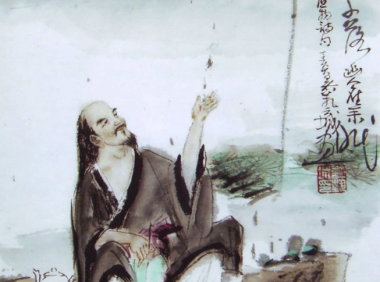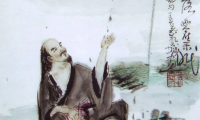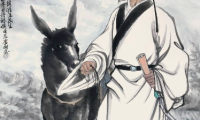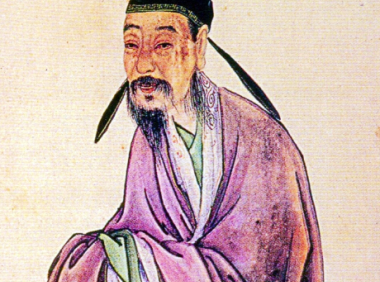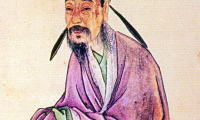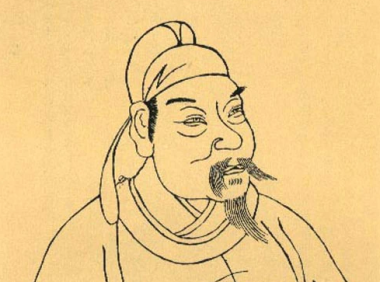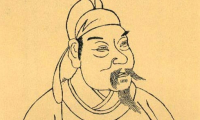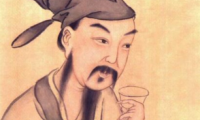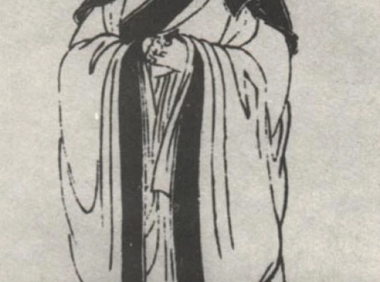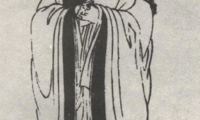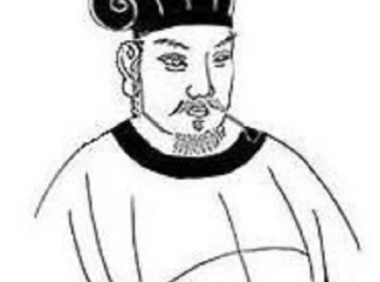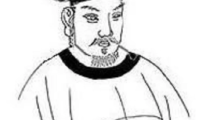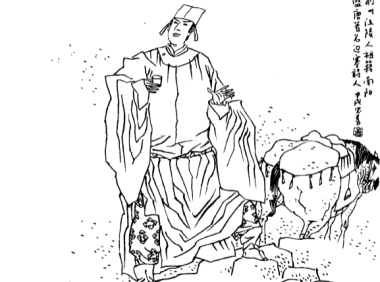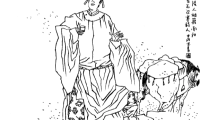-
Wei Yingwu: Heard That Qi Changdang Joined the Army
Wei Yingwu Heard That Qi Changdang Joined the Army 寄畅当:闻以子弟被召从军 窛 贼 起 东 山英 俊 方 未 闲。闻 君 新 应 募籍 籍 动 京 关。 出 身 文 翰 场高 步 不 可 攀。青 袍 未 及 解白 羽 插 腰 间。 昔 为 琼 树 枝今 有 风 霜 颜。秋 郊 细 柳 道走 马 一 夕 还。 丈 夫 当 为 国破 敌 如 摧 山。何 必 事 州 府坐 使 鬓 毛 斑。 Ji Chang Dang: Wen Yi Zi Di Bei Zhao Cong Jun Kou zei qi dong shanYing jun fang wei xian.Wen jun xin ying muJi ji dong jing guan. Chu shen wen han changGao bu bu ke pan.Qing pao wei ji jieBai yu cha yao jian. Xi wei qiong shu zhi.Jin you feng shuang yan.Qiu jiao xi liu daoZou ma yi xi huan. Zhang fu dang wei guoPo di ru cui shan.He bi shi zhou fuZuo shi bin mo ban. Heard That Qi Changdang Joined the Army Bandits and devils arise from the eastern mountainsThe heroic and talented are without leisure.Heard of your joining the new general’s campCapital gates locked, mustering army getting excited to go. Your family background cultured and…... -
Wei Yingwu: In Xizhou, Government Inspector General Chang Zeng Found an Antique Ding
Wei Yingwu In Xizhou, Government Inspector General Chang Zeng Found an Antique Ding 信川录事参军常曾古鼎歌 三 年 纠 一 郡独 饮 寒 泉 井。江 南 铸 器 多 铸 银罢 官 无 物 唯 古 鼎。 雕 螭 刻 篆 相 错 蟠地 中 岁 久 青 苔 寒。左 对 苍 山 右 流 水云 有 古 来 葛 仙 子。 葛 仙 埋 之 何 不 还耕 者 鎗 然 得 其 间。持 示 世 人 不 知 宝劝 君 炼 丹 永 寿 考。 Xin Chuan Lu Shi Can Jun Chang Zeng Gu Ding Ge San nian jiu yi junDu yin han quan jing.Jiang nan zhu qi duo zhu yinBa guan wu wu wei gu ding. Diao chi ke zhuan xiang cuo panDi zhong sui jiu qing tai han.Zuo dui cang shan you liu shuiYun you gu lai ge xian zi. Ge xian mai zhi he bu huanGeng zhe qiang ran de qi jian.Chi shi shi ren bu zhi baoQuan jun lian dan yong shou kao. In Xinzhou, Government Inspector General Chang Zeng Found an Antique Ding For three years you supervised one prefectureOutside government corruption, you were a solitary sound of cold spring water falling into…... -
Du Fu: Army Battle Wagons
dufu Du Fu: Army Battle Wagons On the Move 兵车行 车 辚 辚 马 萧 萧行 人 弓 箭 各 在 腰。耶 娘 妻 子 走 相 送尘 埃 不 见 咸 阳 桥。牵 衣 顿 足 拦 道 哭哭 声 直 上 千 云 霄!道 旁 过 者 问 行 人行 人 但 云 点 行 频。 或 从 十 五 北 防 河便 至 四 十 西 菅 田。去 时 里 正 与 裹 头归 来 头 白 还 戍 边。边 庭 流 血 成 海 水武 皇 开 边 意 未 已。君 不 闻 汉 家 山 东 二 百 州千 村 万 落 生 荆 杞。 纵 有 健 妇 把 锄 犁禾 生 陇 亩 无 东 西。况 复 秦 兵 耐 苦 战被 驱 不 异 犬 与 鸡。长 者 虽 有 问 役 夫 敢 申 恨?且 如 今 年 冬未 休 关 西 卒。县 官 急 索 租租 税 从 何 出?信 知 生 男 恶反 是 生 奴 好生 奴 犹 得 嫁 此 邻生 男 埋 没 随 百 草。君 不 见 青 海 头古 来 白 骨 无 人 收。新 鬼 烦 怨 旧 鬼 哭天 阴 雨 湿…...
- 0
- 0
- 11
-
Du Fu: Going Out Military Music: Nine Poems
dufu Going Out Military Music: Nine Poems 前出塞: 九首 换 弓 当 换 强用 剑 当 用 长。身 人 先 身 马擒 贼 先 擒 王。 杀 人 亦 有 限列 国 自 有 疆。苟 能 制 侵 凌岂 在 多 杀 伤? Qian Chu Sai: Jiu Shou Huan gong dang huan qiangYong jian dang yong changShen ren xian shen maQin zei xian qin wang. Sha ren yi you xianLie guo zi yu jiangGou neng zhi qin lingQi zai duo sha shang? Going Out Military Music: Nine Poems To utilize a bow, it has to be very strong and powerfulTo be useful, swords should be long.Initially shoot to kill their mountsFirst priority is to capture the barbarian leaders. Kill people selectively and with careHonor the borders of the other countries.Control the extent of collateral damageIsn’t it better to kill just the criminal few? ...
- 0
- 0
- 5
-
Du Fu: Long Northern Journey: No. 3
dufu Long Northern Journey: No. 3 北征 经 年 至 茅 屋妻 子 衣 百 结。恸 哭 松 声 回悲 泉 共 幽 咽。 平 生 所 娇 儿颜 色 白 胜 雪。见 耶 背 面 啼垢 腻 脚 不 袜。 床 前 两 小 女补 绽 才 过 膝。海 图 拆 波 涛旧 绣 移 曲 折。 天 吴 及 紫 风颠 倒 在 短 褐。老 夫 情 怀 恶呕 泄 卧 数 日。 那 无 襄 中 帛救 汝 寒 凛 慄?粉 黛 亦 解 苞衾 裯 稍 罗 列。 瘦 妻 面 复 光痴 女 头 自 栉。学 母 无 不 为晓 妆 随 手 抹。 移 时 施 朱 铅狼 藉 画 眉 阔。生 还 对 童 稚似 欲 忘 饥 渴。 问 事 竟 挽 须谁 能 即 嗔 喝?翻 思 在 贼 愁甘 受 杀 乱 聒。新 归 且 慰 意生 理 焉 得 说? Bei Zheng Jing nian zhi mao wuQi zi yi bai jieTong ku song sheng huiBei quan gong you yan Ping sheng suo jiao erYan se bai sheng xue.Jian ye bei mian tiGou ni jiao bu wa. Chuang qian liang xiao nuBu zhan cai guo xiHai tu chai bo…...
- 0
- 0
- 4
-
Du Fu: Mr. Fang: Trainer of Barbarian Cavalry Horses
dufu Mr. Fang: Trainer of Barbarian Cavalry Horses 房兵:曹胡马 胡 马 大 宛 各锋 棱 瘦 骨 成。竹 批 双 耳 峻风 入 四 蹄 轻。 所 向 无 空 阔真 堪 托 死 生。骁 腾 有 如 此万 里 可 横 行。 Fang Bing Cao Hu Ma Hu ma da wan geFeng leng shou gu cheng.Zhu pi shuang er junFeng ru si ti qing. Suo xiang wu kong kuoZhen kan tuo si sheng.Xiao teng you ru ciWan li ke heng xing. Mr. Fang: Trainer of Barbarian Cavalry Horses Barbarian horses come from the famous Da Wan regionSo lean, their muscles and bones like the leading edges of swords.Both ears harshly stand erect like strong bambooFour hooves gracefully move and slice through the wind. Run towards places that are empty and vastRider concerns for life and death unnecessary.I should be like this, brave and galloping wherever I pleaseOn a rampage for thousands of miles. Notes: Da Wan region: Area in western China populated by a non-Han minority.... -
Du Fu: Danqing Painting
dufu Danqing Painting 丹青引赠曹将军霸 将 军 魏 武 之 子 孙于 今 为 庶 为 清 门。英 雄 割 据 虽 已 矣文 采 风 流 今 尚 存。 学 书 初 学 卫 夫 人但 恨 无 过 王 右 军。丹 青 不 知 老 将 至富 贵 于 我 如 浮 云。 开 元 之 中 常 引 见承 恩 数 上 南 薰 殿。凌 烟 功 臣 少 颜 色将 军 下 笔 开 生 面。 良 相 头 上 进 贤 冠猛 将 腰 间 大 羽 箭。褒 公 鄂 公 毛 发 动英 姿 飒 爽 来 酣 战。 先 帝 天 马 玉 花 骢画 工 如 山 貌 不 同。是 日 牵 来 赤 墀 下迥 立 阊 阖 生 长 风。 诏 谓 将 军 拂 绢 素意 匠 惨 淡 经 营 中。斯 须 九 重 真 龙 出一 洗 万 古 凡 马 空。 玉 花 却 在 御 榻 上榻 上 庭 前 屹 相 向。至 尊 含 笑 催 赐 金圉 人 太 仆 皆 惆 怅。 弟 子 韩 干 早 入 室亦 能 画 与 穷 殊 相。干 惟 画 肉 不 画 骨忍 使 骅…... -
Du Fu: Tong Guan Petty Official
dufu Tong Guan Petty Official 潼关吏 士 卒 何 草 草筑 城 潼 关 道。大 城 铁 不 如小 城 万 丈 余。 借 问 潼 关 吏:“修 关 还 备 胡?“要 我 不 马 行为 我 指 山 隅: “连 云 列 战 格飞 鸟 不 能 逾;胡 来 但 自 守岂 复 忧 西 都! 丈 人 视 要 处窄 狭 容 单 车;艰 难 奋 长 戟万 古 用 一 夫。“ “哀 哉 桃 林 战百 万 化 为 鱼!请 嘱 防 关 将慎 勿 学 歌 舒! Tong Guan Li Shi zu he cao caoZhu cheng tong guan dao.Da cheng tie bu ruXiao cheng wan zhang yu. Jie wen tong guan li:“Xiu guan huan bei hu?”Yao wo xia ma xingWei wo zhi shan yu: “Lian yun lie zhan geFei niao bu neng yu;Hu lai dan zi shouQi fu you xi dou! Zhang ren shi yao chuZhai xia rong dan che;Jian nan fen chang jiWan gu yong yi fu.” Ai zai tao lin zhanBai wan hua wei yu!Qing zhu fang guan jiangJu wu xue ge shu! Tong Guan Petty Official [Tong Guan was a strategic mountain pass near the Yellow River, and between the capital cities…...
- 0
- 0
- 13
-
Du Fu: Song of the Conscripts ~杜甫 《兵车行》 with English Translations
dufu 小编导读:《兵车行》是唐代伟大诗人杜甫创作的叙事诗。全诗以“道旁过者问行人”为界分为两段:首段摹写送别的惨状,是纪事;次段传达征夫的诉苦,是纪言。此诗具有深刻的思想内容,借征夫对老人的答话,倾诉了人民对战争的痛恨,揭露了唐玄宗长期以来的穷兵黩武,连年征战,给人民造成了巨大的灾难。全诗寓情于叙事之中,在叙述次序上参差错落前后呼应,变化开阖井然有序,并巧妙运用过渡句和习用词语,造成了回肠荡气的艺术效果。诗人自创乐府新题写时事,为中唐时期兴起的新乐府运动作出了开创性的贡献。 杜甫 《兵车行》 车辚辚,马萧萧,行人弓箭各在腰。耶娘妻子走相送,尘埃不见咸阳桥。牵衣顿足阑道哭,哭声直上干云霄。道傍过者问行人,行人但云点行频。或从十五北防河,便至四十西营田。去时里正与裹头,归来头白还戍边。边亭流血成海水,武皇开边意未已。君不闻汉家山东二百州,千村万落生荆杞。纵有健妇把锄犁,禾生陇亩无东西。况复秦兵耐苦战,被驱不异犬与鸡。长者虽有问,役夫敢申恨。且如今年冬,未休关西卒。县官急索租,租税从何出。信知生男恶,反是生女好。生女犹是嫁比邻,生男埋没随百草。君不见青海头,古来白骨无人收。新鬼烦冤旧鬼哭,天阴雨湿声啾啾。 Song of the ConscriptsDu Fu Chariots rumble and horses grumble.The conscripts march with bow and arrows at the waist.Their fathers, mothers, wives and children come in hasteTo see them off; the bridge is shrouded in dust they’ve raised.They clutch at their coats, stamp the feet and bar the way;Their grief cries loud and strikes the cloud straight, straightaway.An onlooker by roadside asks an enrollee.“The conscription is frequent,” only answers he.Some went north at fifteen to guard the rivershore,And were sent west to till the land at forty.The elder bound their young heads when they went away;Just home, they’re sent to the frontier though their hair’s gray.The field on borderland becomes a sea of blood;The emperor’s greed for land is still at high flood.Have you not heardTwo hundred districts east of the Hua Mountains lie,Where briers and brambles grow in villages far and nigh?Although stout women can wield the plough and the hoe,Thorns and weeds in the east as in the west o’ergrow.The enemy are used to hard and stubborn fight;Our men are driven just like dogs or fowls in flight.“You are kind to ask me.To complain I’m not free.In winter of this yearConscription goes on…...
- 0
- 0
- 105
-
Du Fu: On the Border (first series, nine poems) ~ 《前出塞·其四》 杜甫 with English Translations
dufu 《前出塞九首》是唐代大诗人杜甫的组诗作品。这九首诗通过一个征夫的诉说反映其从军西北边疆的艰难历程和复杂感情。第一首,征夫诉说初出门辞别父母的情事;第二首,接前诉说上路之后的情事,亡命亡不了,吞声也没用,不如索性把命豁出去练上一手;第三首,征夫诉说一路之上心情的烦乱,时而低沉,时而高亢;第四首,征夫诉说在路上被徒长欺压和驱逼的情事;第五首,征夫诉说初到军中时所见到另一面的黑暗,当初满想舍命立功画像麟阁,这时看来也不容易;第六首,征夫诉说他对战略的看法;第七首,征夫诉说他在大寒天的高山上筑城戍守的情事;第八首,征夫诉说他初次立功的过程和对立功的态度;第九首,征夫总结了他“从军十年馀”的经历。组诗尖锐地讽刺了统治者穷兵黩武的不义战争,真实地反映了战争给兵士和百姓带来的苦难。 《前出塞·其四》 杜甫 送徒既有长,远戍亦有身。生死向前去,不劳吏怒嗔。路逢相识人,附书与六亲。哀哉两决绝,不复同苦辛。 On the Border(first series, nine poems) Du Fu We recruits have our commanders to send us off,but, bound for distant duty, we're people too!From here we go to face life or death—no cause for the officers to shout and scowl!Along the road I happened on someone I knew,handed him a letter to give to kinfolk:“Too bad, but we go different ways now,no longer to share the same hardships and pain.”...
- 0
- 0
- 71
-
Du Fu: Accompanying Mr. Zheng of the Broad Learning Academy on an Outing to General He’s Mountain Villa ~ 杜甫·《陪郑文广游何将军山林·其五》with English Translations
dufu 此组诗共十章,当作于公元753年(唐玄宗天宝十二年)初夏,当时杜甫与广文馆博士郑虔同游何将军山林,故作此组诗。 杜甫·《陪郑文广游何将军山林·其五》 剩水沧江破,残山碣石开。绿垂风折笋,红绽雨肥梅。银甲弹筝用,金鱼换酒来。兴移无洒扫,随意坐莓苔。 Accompanying Mr. Zheng of the Broad Learning Academy on an Outing to General He's Mountain VillaTen Poems 5 This stream of yours, as though borrowed from the blue Yangzi,this bit of mountain sliced off from the Jieshi rocks1:green dangling, bamboo shoots broken in the wind;red splitting open, plums fattened by the rain.A silver pick to strum the many-stringed zither,a golden fish exchanged for another round of wine2.We'll move as fancy takes us—don't bother to sweep—sit wherever we please on the mossy ground....
- 0
- 0
- 72
-
Du Fu Poems: Lament of a Homeless – 杜甫《无家别》
dufu 无家别 寂寞天宝后[1], 园庐[2]但蒿藜。 我里百余家, 世乱各东西。 存者无消息, 死者为尘泥。 贱子因阵败, 归来寻旧蹊。 久行见空巷, 日瘦[3]气惨凄。 但对狐与狸, 竖毛怒我啼。 四邻何所有? 一二老寡妻。 宿鸟恋本枝, 安辞且穷栖。 方春独荷锄, 日暮还灌畦。 县吏知我至, 召令习鼓鼙。 虽从本州役, 内顾无所携[4]。 近行止一身, 远去终转迷[5]。 家乡既荡尽, 远近理亦齐。 永痛长病母, 五年委沟溪[6]。 生我不得力, 终身两酸嘶[7]。 人生无家别, 何以为蒸黎[8]! “三别”中《新婚别》写的是年轻的新婚夫妇,《垂老别》写的是年高的老夫老妻,《无家别》写的却是无家可归的中年男子。无家可归的人自称“贱子”,在战乱后回到家乡,只见一片荒凉,满目蒿藜。昔日百户人家,今日只见空巷。天上的太阳也愁容满面,消瘦暗淡;地上不见人迹,只有狐狸出没。近景描写细致,刻画入微。空宅凄凄,家人早已故去,抚今忆昔,不禁感慨系之,把自己比作无枝可栖的归鸟。不料县吏知道他回来了,又征调他去打鼓。于是他自喜自伤,喜的是在本州服役,伤的是无人送别;但一想到还要远去打仗,远近又有什么分别?这样层层深入地分析他的心理变化,又通过环境的描写,反映人物的思想感情。 注释: [1]天宝后:安史之乱后。安史之乱爆发于天宝年间,故称“天宝后”。 [2]庐:住所,房屋。 [3]日瘦:日光淡薄。 [4]无所携:家里没有人可以作别。 [5]终转迷:终究前途未卜,生死难料。 [6]委沟溪:母亲被埋葬在山谷中。 [7]两酸嘶:母子二人含恨。 [8]蒸黎:劳动人民。 Lament of a Homeless Since the rebellion I feel lone, My house with weeds is overgrown. A hundred homes can find no rest; People are scattered east and west. None knows where the living have fled, While to dust have returned the dead. My humble self after the defeat Come back to find my old retreat. I walk long on deserted lanes. The sun grows lean where drear air reigns. In face of bristling fox or cat, I am afraid to be growled at. How many neighbors left, all told? Only one or two widows old. A bird will not leave its own nest, My house, though poor, will give me rest. To hoe up weeds in spring's my lot, At dusk I water garden plot. The magistrate knowing I've come Orders me to learn to beat drum. For service in my native land, I need not carry things in hand. Alone, I care not where…...
- 0
- 0
- 21
-
Du Fu Poems: For Wei the Eighth – 杜甫《赠卫八处士》
dufu 赠卫八处士 人生不相见, 动如参与商。 今夕复何夕? 共此灯烛光。 少壮能几时? 鬓发各已苍[1]。 访旧半为鬼, 惊呼热中肠。 焉知二十载, 重上君子堂? 昔别君未婚, 儿女忽成行。 怡然敬父执[2], 问我来何方? 问答乃未已[3], 儿女罗酒浆。 夜雨剪春韭, 新炊[4]间黄粱[5]。 主称会面难, 一举累[6]十觞。 十觞亦不醉, 感子故意长[7]。 明日隔山岳, 世事两茫茫。 《唐史拾遗》中说:“杜甫与李白、高适、卫宾相友善,时宾年最小,号小友。”卫八处士可能就是卫宾,八是排行,处士就是不出仕的隐士。这首诗是公元759年写的。前十句抒情,先说会面之难,可见相会之乐。中间转为叙事,说到变化之大,儿女成长之快,主人款待之殷,写出了朋友之情,长幼之义。最后两句想到明天的别离,今天的相会越乐,明天的离别就越悲。全诗前后一片茫茫,更显得诗意沉郁了。 注释: [1]苍:灰白色。 [2]父执:父亲经常接近的朋友。 [3]乃未已:话未说完。 [4]新炊:刚煮好的新鲜饭。 [5]黄粱:黄米。 [6]累:连续。 [7]故意长:老友间的深情厚谊。 For Wei the Eighth How rarely together friends are! As Morning Star with Evening Star. O what a rare night is tonight? Together we share candlelight. How long can last our youthful years? Grey hair on our temples appears. We find half of our friends departed. How can we not cry broken-hearted! After twenty years, who knows then, I come into your hall again. Unmarried twenty years ago, Now you have children in a row. Seeing their father's friend at home, They're glad to ask where I come from. Our talk has not come to an end, When wine is offered to the friend. They bring leeks cut after night rain And millet cooked with new grain. The host says, “It is hard to meet. Let us drink ten cups of wine sweet!” Ten cupfuls cannot make me drunk, For deep in your love I am sunk. Mountains will divide us tomorrow. O What can we foresee but sorrow! 《赠卫八处士》是唐代大诗人杜甫的作品。此诗作于诗人被贬华州司功参军之后。诗写偶遇少年知交的情景,抒写了人生聚散不定,故友相见格外亲。然而暂聚忽别,却又觉得世事渺茫,无限感慨。开头四句,写久别重逢,从离别说到聚首,亦悲亦喜,悲喜交集;第五至八句,从生离说到死别,透露了干戈乱离、人命危浅的现实;从“焉知”到“意长”十四句,写与卫八处士的重逢聚首以及主人及其家人的热情款待,表达诗人对生活美和人情美的珍视;最后两句写重会又别之伤悲,低徊婉转,耐人寻味。全诗平易真切,层次井然。 This poem is written by…...
- 0
- 0
- 9
-
Du Fu Poems: Song on the Frontier (II) – 杜甫《后出塞 (五首其二)》
dufu 后出塞(五首其二) 朝进东门营, 暮上河阳桥。 落日照大旗[1], 马鸣风萧萧。 平沙列万幕[2], 部伍各见招。 中天悬明月, 令严夜寂寥。 悲笳[3]数声动, 壮士惨不骄。 借问大将[4]谁? 恐是霍嫖姚[5]。 后出塞组诗一共五首,这是其中的第二首,以一个刚刚入伍的新兵的口吻,叙述了出征关塞的部伍生活情景。早上进入洛阳城东的军营,晚上到达孟津河阳桥。“落日”四句,描绘了一幅千军万马的壮阔军容,“落日”“平沙”充满了边塞风情。“寂寥”对应前文的“万幕”,又以明月中天衬托“寂寥”,越发映出军令如山下无人作声的安静。这样的寂静中,响起了静营的军号声,一个“悲”字,就写出了悲从中来的意境。至此,这位新兵不禁慨然兴问,统率这支军队的大将是谁呢?但因为时当静营之后,慑于军令的森严,不敢发问,只是心里揣测,大概是像霍去病那样的将领吧!以此结尾,更使军容的壮阔整肃深入人心。 注释: [1]大旗:大将用的红旗。 [2]幕:帐幕。 [3]悲笳:静营的号令。笳,古代乐器,音色悲壮,常用作军中号角。 [4]大将:指召募统军之将。 [5]嫖(piáo)姚(yáo):同“剽姚”,指霍去病。汉武帝时,霍去病是嫖姚校尉。 Song on the Frontier(II) At dawn we come to Camp of Eastern Gate; At dusk we cross the bridge on Yellow River. Reddened at sunset, our flags undulate; In whistling wind our neighing horses quiver. Thousands of tents aligned on sandy ground, All the ranks and files answer the roll call. Bright in the sky above hangs a moon round, Silence and order reign since the nightfall. Sad Tartar bugles stir our warriors' heart, How could they of their homesickness be proud? What could their commander do for his part, Even if he could sweep away the cloud?...
- 0
- 0
- 13
-
Du Fu Poems: Song of the Frontier (VI) – 杜甫《前出塞 (九首其六)》
dufu 前出塞(九首其六) 挽[1]弓当挽强, 用箭当用长。 射人先射马, 擒贼先擒王。 杀人亦有限, 列国自有疆[2]。 苟能[3]制侵陵[4], 岂在多杀伤! 据说《前出塞》是写天宝末年哥舒翰征伐吐蕃的事。前四句很像当时军中流行的作战歌诀,讲如何练兵用武,克敌制胜。诗人用了欲擒先纵、先扬后抑的手法。后四句转写战争不应该多杀伤,而要在制止侵略的范围之内,尽量减少伤亡,这样才能体现“止戈为武”的精神。唐诗中以议论为主的很少,这首诗却以议论见长,并且富于哲理。 注释: [1]挽:拉。 [2]疆:边界。 [3]苟能:如果能。 [4]侵陵:侵犯。 Song of the Frontier(VI) The bow you carry should be strong; The arrows you use should be long. Before a horseman, shoot his horse; Capture the chief to beat his force! Slaughter shan't go beyond its sphere; Each State should guard its own frontier. If an invasion is repelled, Why shed more blood unless compelled? ...
- 0
- 0
- 5
-
Du Fu Poems: Song of the Conscripts- 杜甫《兵车行》
dufu 兵车行 车辚辚[1],马萧萧, 行人[2]弓箭各在腰。 耶[3]娘妻子走相送, 尘埃不见咸阳桥[4]。 牵衣顿足拦道哭, 哭声直上干[5]云霄。 道旁过者问行人, 行人但云点行频。 或从十五北防河, 便至四十西营田。 去时里正与裹头, 归来头白还戍边。 边庭[6]流血成海水, 武皇开边意未已。 君不闻, 汉家山东二百州, 千村万落生荆杞[7]。 纵有健妇把锄犁, 禾生陇亩[8]无东西。 况复秦兵耐苦战, 被驱不异犬与鸡。 长者虽有问, 役夫敢申恨? 且如今年冬, 未休关西卒。 县官急索租, 租税从何出? 信知生男恶, 反是生女好。 生女犹得嫁比邻, 生男埋没随百草。 君不见, 青海头, 古来白骨无人收。 新鬼烦冤旧鬼哭, 天阴雨湿声啾啾。 这首诗通过目睹耳闻的送别情景,揭露了唐玄宗对外发动战争给人民带来的痛苦,充满了反战情绪。诗从客观描写开始,说到“道旁过者问行人”,“过者”是过路人,就是杜甫自己;“行人”谈到15岁出征,40岁还在戍边的“征夫”。这句以上写诗人亲眼所见;以下写亲耳所闻:“行人但云点行频”,就是征夫回答说征兵太频繁了。下面的“武皇”是以汉喻唐,用汉武帝影射唐玄宗,“汉家”也是暗指唐王室。“长者虽有问”一句中,“长者”是征夫对诗人的尊称,“役夫”是征夫的自称。“未休关西卒”是说还在大量征兵,要去关西打仗。这是诗人通过当事人的口述,揭露征兵和逼租给人民造成的苦难。最后,诗人用哀痛的笔调描述了战场上的悲惨现实。全诗运用口语非常突出,前人评说:“语杂歌谣,最易感人,愈浅愈切。” 注释: [1]辚(lín)辚:雷声,比喻行车的声音。 [2]行人:指出征的士兵。 [3]耶:通假字,同“爷”,父亲。 [4]咸阳桥:唐代时期是长安通往西北的必经之路。 [5]干(ɡān):冲。 [6]边庭:边疆。 [7]荆杞(qǐ):荆棘、枸杞,带刺的野生灌木。 [8]陇(lǒnɡ)亩:田地。 Song of the Conscripts Chariots rumble And horses grumble. The conscripts march with bow and arrows at the waist. Their fathers, mothers, wives and children come in haste To see them off; the bridge is shrouded in dust they've raised. They clutch at their coats, stamp the feet and bar the way; Their grief cries loud and strikes the cloud straight, straightaway. An onlooker by roadside asks an enrollee. “The conscription is frequent, ” only answers he. Some went north at fifteen to guard the rivershore, And were sent west to till the land at forty or more. The elder bound their young heads when they went away; Just home, they're sent to the frontier though their hair's gray. The field on borderland becomes a sea of blood; The emperor's greed for land is still at high flood. Have you not heard Two hundred districts east of the Hua Mountains lie, Where…...
- 0
- 0
- 6
-
Wang Wei: Sent As an Envoy to a Strategic Border Stronghold
Wang Wei Wang Wei: Sent As an Envoy to a Strategic Border Stronghold 使至塞上 单 车 欲 问 边属 国 过 居 延。征 蓬 出 汉 塞归 雁 入 胡 天。 大 漠 孤 烟 直长 河 落 日 圆萧 关 逢 候 骑都 护 在 燕 然。 Shi Zhi Sai Shang Dan che yu wen bianShu guo guo ju yanZheng peng chu han saiGui yan ru hu tian Da mo gu yan zhiChang he luo ri yuanXiao guan feng hou qiDu hu zai yan ran. Sent As an Envoy to a Strategic Border Stronghold Traveling in a single carriage to inspect the borderAt Juyan, an area that just came under the country’s rule.Arrive at the Han border stronghold after a long journey through wind-blown tall grassesReturning wild geese enter the Hu skies. Large desert, solitary sand twisters straight up into the skyLong river, setting sun still round.At the Xiao fortress on a strategic mountain pass, I await at the station to change horsesTold that a general of the palace guard, returning from a victory at Mt. Yanran, will take the next fresh horse. Notes: Juyan: An area on the Mongolian frontier Han: A Chinese military outpost. Hu: non-Han, nomadic people and…...
- 0
- 0
- 9
-
Lu Yu: Encounter a Big Snow On the Road to Yi Yang
Li Yu Encounter a Big Snow On the Road to Yi Yang 弋阳道中遇大雪 我 行 江 郊 暮 犹 进大 雪 塞 空 迷 远 近。壮 哉 组 练 从 天 来人 间 有 此 堂 堂 阵? 少 年 颇 爱 军 中 乐跌 宕 不 耐 微 官 缚。凭 鞍 寓 目 一 怅 然思 为 君 王 扫 河 洛。 夜 听 簌 簌 窗 纸 鸣恰 似 铁 马 相 摩 声。起 倾 斗 酒 歌 出 塞弹 压 胸 中 十 万 兵。 Yi Yang Dao Zhong Yu Da Xue Wo xing jiang jiao mu you jinDa xue sai kong mi yuan jin.Zhuang zai zu lian cong tian laiRen jian you ci tang tang zhen? Shao nian po ai jun zhong leDie dang bu nai wei guan fu.Ping an yu mu yi chang ranSi wei jun wang sao he luo. Ye ting su su chuang zhi mingQia si tie ma xiang mo sheng.Qi qing dou jiu ge chu saiDan ya xiong zhong shi wan bing. Encounter a Big Snow On the Road to Yi Yang Outskirts around the Xing River at sunset darkenLarge snowstorm covers the border regions far and wide.Wow! Storm moves on from…...
- 0
- 0
- 116
-
Wang Wei: On a Mission Towards the Frontiers ~ 《使至塞上》 王维 with English Translations
Wang Wei 小编导读:《使至塞上》是唐代诗人王维奉命赴边疆慰问将士途中所作的一首纪行诗,记述出使塞上的旅程以及旅程中所见的塞外风光。首联两句交待此行目的和到达地点,诗缘何而作;颔联两句包含多重意蕴,借蓬草自况,写飘零之感;颈联两句描绘了边陲大漠中壮阔雄奇的景象,境界阔大,气象雄浑;尾联两句虚写战争已取得胜利,流露出对都护的赞叹。此诗既反映了边塞生活,同时也表达了诗人由于被排挤而产生的孤独、寂寞、悲伤之情以及在大漠的雄浑景色中情感得到熏陶、净化、升华后产生的慷慨悲壮之情,显露出一种豁达情怀。 Editor's introduction: "Envoy to the Frontier" is a travel poem written by Wang Wei, a Tang Dynasty poet, on his way to the frontier to comfort the soldiers. It records the journey to the frontier and the scenery he saw during the journey. The first two lines explain the purpose of the trip and the destination, and why the poem was written; the second two lines contain multiple meanings, using the weeds to describe the self-image and the feeling of being adrift; the third two lines describe the magnificent and magnificent scenery in the desert at the border, with a vast realm and majestic atmosphere; the last two lines describe the victory of the war, expressing admiration for the governor. This poem not only reflects the life at the frontier, but also expresses the loneliness, loneliness, and sadness of the poet due to being excluded, as well as the generous and tragic feelings that arise after the emotions are nurtured, purified, and sublimated in the majestic scenery of the desert, revealing an open-minded sentiment. 《使至塞上》 王维 单车欲问边,属国过居延。征蓬出汉塞,归雁入胡天。大漠孤烟直,长河落日圆。萧关逢候骑,都护在燕然。 On a Mission Towards the Frontiers A solitary carriage to the frontiers bound,An envoy with no retinue around,A drifting leaf…...
- 0
- 0
- 87
-
Du Mu: Send Off Grand Master Wang
Du Mu Send Off Grand Master Wang Feng 送国棋王逢 玉 子 纹 楸 一 路 饶最 宜 檐 雨 竹 萧 萧。蠃 形 暗 去 春 泉 长拔 势 横 来 野 火 烧。 守 道 还 如 周 伏 柱鏖 兵 不 羡 霍 嫖 姚。得 年 七 十 更 万 日与 子 期 于 局 上 销。 Song Guo Qi Wang Feng Yu zi wen qiu yi lu raoZui yi yan yu zhu xiao xiao.Luo xing an qu chun quan changBa shi heng lai ye huo shao. Shou dao huan ru zhou fu zhuAo bing bu xian huo piao yao.De nian qi shi geng wan riYu zi qi yu ju shang xiao. Send Off Grand Master Wang Feng Beautiful small hard pieces of jade, inlaid with patterned grain of catalpa wood, you always give opponents a handicapVery appropriate to play you under the eaves during rain and the rustling winds through the bamboo.Give your competitors an early impression that you are far from the springheadAfter your original defense, your raging fire arrives to destroy everything from west to east. Defend one’s integrity throughout each cycle of human activitiesEngaged in fierce battles, you are not jealous of Huo Piaoyao.At…...
- 0
- 0
- 13
-
Xu Hun Poem: Frontier Song – 许浑《塞下曲》
"Frontier Song" is a five-line poem written by Xu Hun, a poet of the Tang Dynasty....
- 0
- 0
- 89
-
Lu Lun Poem: Border Songs (Ⅲ) – 卢纶《塞下曲(其三)》
Lu Lun 塞下曲[1](其三) 卢纶 月黑雁飞高, 单于[2]夜遁逃。 欲将轻骑逐, 大雪满弓刀。 注释: [1] 塞下曲:古代歌曲名。作品多描写边境风光和战争生活。卢纶的《塞下曲》组诗共六首,这是其中的第三首。六首分别写发号施令、射猎破敌、奏凯庆功等军营生活。诗题一作“和张仆射塞下曲”。因为是和作,故语多赞美之意。 [2] 单于:匈奴最高统治者的称呼,这里代指入侵者的最高统帅。 Border Songs (Ⅲ) Lu Lun Wild geese fly high in moonless night; The Tartars through the dark take flight. Our horsemen chase them, armed with bow And sword covered with heavy snow. The poet glorifies the cavaliers in pursuit of the foe on a snowy night....
- 0
- 0
- 104
-
Lu Lun Poem: Border Songs (Ⅱ) – 卢纶《塞下曲(其二)》
塞下曲(其二) 卢纶 林暗草惊风[1], 将军夜引弓[2]。 平明[3]寻白羽[4], 没[5]在石棱[6]中。 注释: [1] 惊风:突然被风吹动。 [2] 引弓:拉弓、开弓,这里包含下一步的射箭。 [3] 平明:天刚亮的时候。 [4] 白羽:箭杆后部的白色羽毛,这里指箭。 [5] 没:陷入,这里是钻进的意思。 [6] 石棱:石头的边角。 Border Songs (Ⅱ) Lu Lun In gloomy woods grass shivers at wind’s howl; The general takes it for a tiger’s growl. He shoots and looks for his arrow next morn Only to find a rock pierced amid the thorn....
- 0
- 0
- 79
-
Cen Shen Poem: Song of the Running Horse River in Farewell to General Feng on His Western Expedition – 岑参《走马川行奉送封大夫出师西征》
The poem "Song of the Running Horse River in Farewell to General Feng on His Western Expedition" is a poem written by the poet Cen Shen in the Tang Dynasty....
- 0
- 0
- 77













